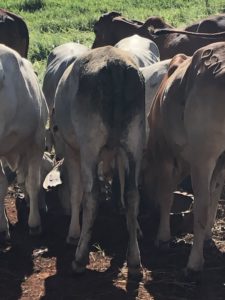Post-weaning diarrhoea
Post-weaning diarrhoea (PWD) is a very common condition in weaned calves. It is mainly caused by two coccidia (Eimeria bovis and E. zuernii) that normally inhabit the intestinal tract. Coccidiosis is the disease caused by coccidian infection. Cattle contract these organisms from herd mates within a day of birth.
Under normal circumstances, coccidia cause no significant problems as cattle develop an immunity that keeps the coccidia populations suppressed. However, if the immune system in the calf’s gut is compromised, the parasite can reproduce rapidly and cause substantial damage to the intestinal lining.
Weaning is a very stressful time for a calf and this stress can compromise the immune system, allowing these coccidia to build up. The immune system in the intestinal lining requires a constant flow of digesta. Interrupting the feed supply to weaned calves for as little as one day can compromise the gut’s immune system and precipitate coccidiosis. Usually clinical disease will become apparent about four weeks after the time when the immune system was suppressed.
 Signs of coccidiosis
Signs of coccidiosis
- Bloody or black, foul smelling, watery faeces with or without blood in the faeces.
- Pale gums and membranes around the eyes (anaemia).
- Poor growth, evident dehydration and in some cases seizures and death.
Coccidiosis is typically a self-limiting, stress induced parasitic disease, but damage can be significant despite this. The parasite usually damages its own environment to the extent that it no longer has a suitable environment in which to successfully reproduce. At this point intestinal populations of coccidia decline rapidly and the disease regresses.
If an affected calf is not given appropriate medication, such as antibiotics or anti-diarrhoeal powders, to control the parasite, it may continue to suffer chronic intestinal damage from coccidia. If left untreated, the intestine can be scarred, which may affect the long-term growth and production.
Prevention and management
These strategies for prevention and management of PWD are recommended:
- Ensure calves have immediate access to nutritious palatable feedstuffs to satisfy voluntary feed intake from the point of weaning. This can be achieved by feeding good quality hay and concentrates in the weaning yard on the day the calf is weaned.
- Reduce the stress of weaning as much as possible. Ensure newly weaned calves have access to warm, dry yards with shade and a plentiful supply of clean water.
- Well-drained yards (3-4 sq. metres per head) and adequate trough space (15-20 cm per head) ensures all weaners have ample access to feed and water.
- Include a coccidiostat in the weaner’s rations. Rumensin® (active ingredient monensin) is a commercially available product commonly used in calf and weaner rations. It should be included to achieve an intake of approximately 25mg/head/day. This will minimise and prevent coccidiosis; however Rumensin® is not effective after an outbreak has already occurred. Take care in using this product: over-dosing in cattle is quite toxic, and in horses even small amounts can be lethal.
- Calves suffering severe and/or chronic PWD can be treated individually with Scourban® under veterinarian prescription and supervision.
- Ensure feed products include a coccidiostat, antibiotic and anti-diarrhoeal powders, as well as electrolytes.
Megan Munchenberg, Department of Agriculture and Fisheries
This document was reviewed as part of the GrazingFutures Project. GrazingFutures is funded by the Queensland Government’s Drought and Climate Adaptation Program that aims to build drought and business resilience for Queensland livestock producers.